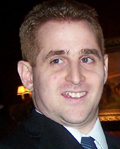In the audio seminar series Secrets of the Charity Auction Experts we provide a lot of tips and tools for planning successful live and silent auction fundraisers. Of course these auctions happen in the context of a special event. So in addition to getting auction items and such, there’s so much general event planning that must be done.
Steve Lieberstein has a well rounded background in all kinds of fundraising. In our one hour interview he talked about the logistics of planning an event, the importance of details, how to motivate volunteers, examples of creative event themes and auction items and how to connect the event with other fundraising strategies. That’s what I call 360 degree planning!
Here’s a short audio clip (8 minutes) from our interview, with transcript version below:
Sandra Sims: You’ve done a lot of different types of fundraising, because you talked about doing prospect research, and you’ve done major gifts and special events. In your experience, how does an organization find that balance in using those different fundraising strategies?
Steve Lieberstein: That’s a great question. Nowadays you hear and you see the great nonprofit organizations really have a good menu of very diverse fundraising strategies. I’ve been in a lot of environments in the past that were so heavily event focused, special event fundraising seems to be the, I would say, ‘sexy’ fundraising strategy, but I think the key is to have a diverse balance, and from my experience, number one is major gifts. If you don’t have a major gift program, I always say to people, what are you waiting for? I think major gifts, planned giving, direct mail, and I think now we’re not just focussing on direct mail, we’re looking more towards a more integrated communications program for annual giving, so we can reach different constituencies.
You also have to look at corporate and foundation giving as well. It’s also important to look at the potential of earned income opportunities. I’ve just been working with a hospital recently and we had an upscale boutique shop that it was a great earner. But, of course, resources come into play. How do you do all these things? I think the face-to-face is important and building on those … you’re touching so many people with special events.
Sandra Sims: Well that’s definitely a great point. I like the fact that you talked about just now, how major gifts are very important, and you may have a really good special event, but if you don’t have something to back it up with, you’re probably losing out on some opportunities there.
Steve Lieberstein: I couldn’t agree with you more Sandra. I think it’s key. Right now, if you look at trends right now, and some nonprofits are scaling back on the type of events, and people are getting frustrated with their major gifts work, because they’re receiving a lot of ‘Nos’ at this point, but it’s still important to cultivate those relationships and to be in their face and let them know things are … don’t go towards the doomsday approach, I’m sure, which you’ve heard before, and just let them know what the organization or the institution is working on, and when it’s time, you’re going to be in a better position to be a beneficiary of a gift.
Sandra Sims: That is a great point. That’s much more of a long term perspective, a long term strategy, rather than, you know, just ‘what can you get right’ now from them.
Steve Lieberstein: Yes, exactly.
Sandra Sims: Definitely. Of course, today we’re mainly going to be talking about special events and you’ve done quite a few special events, and in particular, our interest today is in auctions. Tell me a little bit about some of the special events that you’ve planned, and whenever you start planning an event, especially one with an auction, what would be the first thing that you would do?
Steve Lieberstein: I’ve done many different types of special events, from working on parts of a fashion show, to a – this is probably new – to a kite festival, to golf tournaments, to galas, and also, galas that have included charity auctions, to just strict auctions.
I think the first thing that you need to do, especially when planning a huge undertaking such as an auction, is you have to make sure that you start early, in terms of the planning process; make sure you have your objectives and financial goals set, and it’s important to begin establishing that leadership structure.
You need to have a large circle of friends and acquaintances who can be asked for donations, or will be asking for donations of merchandise and services and goods, and you also need people, given that this is such a huge undertaking, who can help with the administration piece, because this is very intensive.
Sandra Sims: I’m curious, especially if it’s an event that maybe the organization has not planned before. Maybe they’re trying something new? How early do you think they should start planning?
Steve Lieberstein: That’s a good question. I like to look at things way far out. I like to start thinking six to nine months out, especially for a new event, definitely that much time, because it’s going to take a lot to put together. I’ll go into that, I can talk a little bit about how you keep that planning on schedule, but I think you really have to have all the details; if you have a theme; what type of items; who will have access to these items; what’s going to draw the most interest from the community? These things don’t happen overnight, and the details will be important.
Sandra Sims: That’s definitely true and I know I’ve worked on some events where our planning timetable, the Christmas holidays and the New Year fell right in the middle of it, so we almost had to add an extra two months for planning, simply because January and December, people are not really wanting to come to committee meetings.
Steve Lieberstein: Yes, that’s tough.
Sandra Sims: Yes, so some of those things you have to take into consideration when you’re planning your schedule.
Steve Lieberstein: I agree, and if you do plan well, you’ll be able to overcome some of the things that always come up with the special events.
Sandra Sims: Oh, exactly. You can’t plan for every contingency, I’m sure. Things are always going to pop up. So you talked about setting your goals for the event, and then planning early. What are some other important factors for the event planners to focus on?
Steve Lieberstein: I definitely think what makes or breaks an event are the details. Paying attention to those details: if they’re not done correctly, the event could either fall apart, or if it’s done correctly you’re going to create an amazing product. This is an enormous opportunity; you don’t want to waste it, especially when you’re impressing prospects on your own turf.
Really being careful, and planning far ahead to overcome some of the crises that happen with special events; will you have enough time to make sure that you are able to work around that, in terms of engaging the committee, the details of decorating, making sure you have the proper attendance at the event, make sure you’re focused on your budget, just in case you’re on a budget line; so it’s all in the details.
You want people, after the event, just to be so inspired about your organization, that they’re going to want to continue to be involved with your organization afterwards.
Sandra Sims: Right, and sometimes it’s those little details that people walk away with, remembering.
Steve Lieberstein: Sure, it is. That one little thing, a cold meal, can make or break the event. Or, the food wasn’t cooked right; there are just so many … it’s hard to be perfect, but you have to strive to be as close to perfect as you can be.
A few of the benefits you’ll get from listening to this entire interview:
- Job descriptions for members of your planning team
- Ways to motivate and inspire volunteers
- How to make sure planning stays on schedule
- Key strategies that made one event that he planned so successful – raising over $100,000
- The biggest mistake nonprofit leaders can make with special events (and how you can avoid it)
- How to connect your special events with other fundraising strategies for a long term approach
You’ll get the entire one hour interview in both audio download and text transcript as part of Secrets of the Charity Auction Experts.








